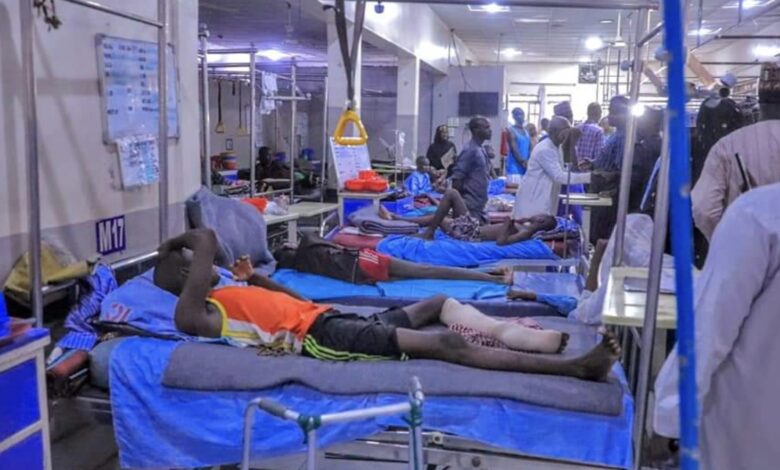
Dropping names of high-ranking officers and using accoutrements of military and para-military outfits, including regular or camouflage gears, badges, ranks, and identity cards among others to intimidate and coerce others, as well as to perpetrate criminal activities, are on the rise. BERTRAM NWANNEKANMA writes that in addition to the menace, which this ugly development poses, it also constitutes an albatross to national security.
Even though there are no laws specifying definite punishments for shady characters that impersonate security operatives, Section 484 of the Criminal Code Act prescribes a general punishment for the offence of impersonation.
Under the Act, anyone, who with intent to defraud any person, falsely represents himself to be some other person, living or dead, is guilty of a felony, and is liable to imprisonment for three years.
Also, if the representation is that the offender is a person entitled by will, or operation of law to any specific property, and he commits the offence to obtain such property or possession thereof, he is liable to imprisonment for 14 years.
Notwithstanding the provision of this law, the trend of impostors presenting themselves as personnel of security agencies, causing disturbances, engaging in theft through deception, and at times, resorting to violent crimes while using security agencies’ uniforms is increasing and compounding the nation’s security challenges.
In many cases, these impostors have abducted citizens because the victims mistook them for security agencies, only to recognise that they had been deceived.
Others, who pulled up in their vehicles for “routine security checks,” ended up losing their lives and property. With heightened insecurity challenges, especially in the North and some parts of the South, the use of several security agencies’ accoutrements by criminals is impeding efforts aimed at curbing crime and criminality.
Security experts are linking this growing trend to several factors, including the institutional gap within security agencies, poverty, and the desire by some to engage in criminality.
Beyond kidnapping and other violent crimes, some imposters exploit the names of high-ranking police officers, including that of the Inspector-General of Police, Olukayode Egbetokun, to intimidate, coerce and generally harass others.
Recently, the Nigeria Police Force (NPF), through its Public Relations Officer, Olumuyiwa Adejobi, expressed concerns about the activities of these individuals, who operate as middlemen, and act as negotiators on behalf of individuals involved in criminal activities.
He encouraged Nigerians to be “vigilant and exercise discernment when approached by anyone using the names of senior police officers, as this practice not only undermines trust in law enforcement agencies, but also poses a significant threat to the integrity of our justice system.” He also urged police officers, who may consider working with such “middlemen” to be cautious, as anyone found guilty will face the consequences.
“In addition to the issues of name-dropping and impersonation, we also wish to draw the public’s attention to the fraudulent activities of individuals who parade themselves as police auctioneers.
“These fraudsters are not affiliated with the Nigeria Police Force in any official capacity. We want to emphasise that we have duly registered auctioneers, who follow established procedures for conducting public auctions.
“Any deviation from these procedures is unlawful, and we urge the public to be vigilant against fraudulent practices,” Adejobi warned. Interestingly, while the police say that it is constantly on the trail of these characters, they seem to proliferate in arithmetic progression.
For instance, residents of Oke-Ata, Soyoye, Ibara Orile, Rounder, and other communities in Abeokuta North Local Council of Ogun State, for some months lived in fear over the activities of kidnappers, who were always decked in military camouflage.
According to members of these affected communities, including those situated around the Alamala Army Barracks, their abductors always dressed this way to disguise and deceive their targets.
Adeniyi Sanni, an aide to the senator representing Ogun West, Solomon Adeola, who was abducted on August 5, 2023, by supposed security agencies,
at a checkpoint around Ojodu-Berger area of Lagos State, was later found dead around Toyota Bus Stop, along the Oshodi-Apapa Expressway.
Upon being accosted by the criminals, Adeola, who was initially communicating with his wife, informed her that he was questioned about his vehicle’s documents. His suddenly becoming incommunicado heightened fears that something unpleasant had happened to him.
Arrested in connection with Adeola’s murder were Fred Okunnu, Lucky Michael, and Adedigba Segun. Michael, who presented himself as a military man, was found out to have served at the Kirikiri Maximum Security Prison between 2019 and 2022, but was released when a non-governmental organisation intervened.
On October 26, 2021, the 81 Division of the Nigerian Army, Lagos, paraded Abdulhakeem Mohammed, Babale Salisu, Christopher Francis, Vivian Titus, Jude Nwanosike, and Dennis Embeleakpo, after they were arrested for impersonating military men, in Lagos.
One of them, Salisu, a dismissed personnel of the Nigerian Army, was arrested at ABC Building, Broad Street, Lagos Island, while trying to forcefully eject occupants of the building. At the time of his arrest, he was dressed in the Nigerian Army camouflage.
Titus, a female suspect, according to the Nigerian Army, was arrested on May 20, 2023, at Agip Gate, Nigerian Army Cantonment, Ojo Mammy Market following a tip-off. She was dressed in a Nigerian Army camouflage shirt and had a fake ID Card number 09NA/63/1988. The fake ID claimed that she was a corporal.
In September 2023, 9 Brigade of the Nigerian Army, Ikeja Cantonment, Lagos, also arrested five persons who had been masquerading as soldiers. Among the suspects, Salami Olamilekan, Muhammed Bilyaminu, Abijo Taofeek, Adewale Quadri, and Johnson Ayemoba, a 32-year-old, who was found dressed in full military camouflage, with a photograph of himself wearing the Nigerian Army uniform.
During interrogation, Ayemoba claimed that the army uniform was a gift from a friend. In January this year, the Nigerian Navy Ship Beecroft arrested three personnel of the Gallantry Intelligence Corps of Nigeria, a security outfit, in the Isolo area of Lagos State.
The suspects, who were dressed in black berets navy blue combat shirts and trousers, were Oladele Daniel, 23, Eriwole Ogunlana, 24 and Mubarak Mayegun, 24. In Nasarawa State, two suspected armed robbers, kitted themselves with the Nigerian Army uniform as they robbed hapless citizens on the highway, last month.
Before their arrest, the suspects, Abdullahi Basso and Saidu Isah, had been terrorising parts of the Ekye Development Area of Doma Local Council. After a cursory look at the unpleasant situation, a security expert and retired director of the Department of State Services (DSS), Dennis Amachree, declined to rule out the possibility that some law enforcement agents could be complicit in the menace.
Amachree added that the prevailing act of theft through deception is, among other things, fuelled by the soaring level of poverty that is pervading the country.
He stressed that the hoard of unemployed graduates has become a veritable source of individuals to populate the mythical devil’s workshop, adding that the implication of this to the nation is a serious reputational risk as currently experienced by citizens carrying the green passport.
“Many believe that most Nigerians are up to no good. Fortunately, these acts are quietly being countered by Nigerian professionals, who are changing the narrative and correcting the image of the country. Good governance could also help in reversing this trend.”
For the spokesperson of the Lagos State Command of the NPF, Benjamin Hundeyin, some of these imposters are dismissed soldiers and police officers. Some are friends, or relatives of dismissed or serving officers, while some bring the uniforms from across the border.
According to him, some of the uniforms that the perpetrators are caught with are not Nigerian Army uniforms, but that of the army of other countries. He stressed that the police as the prosecuting law enforcement agency has been hot on the heels of these criminal elements, arresting them in compliance with the law.
He said: “We are arresting and prosecuting them. We also go beyond prosecution. We investigate the source of the uniform that they use, and the people involved in the illegal act are also apprehended and prosecuted.”
A former Lagos State Commissioner of Police, Hakeem Odumosu, is of the view that the trend portends danger for our country and a threat to national peace and security.
“The scourge has negative implications on the nation’s security and crime rate. It needs to be stamped out, and we are happy that the military is working with the NPF on this to ensure that we stop the supply chain, and discourage the practice. This doesn’t bode well for internal security and we are working assiduously to reduce it to the barest minimum.
“It, therefore, behooves law enforcement agencies to enforce the law banning the activities of illegal military outfits.” While the former Director of Public Relations of the 9 Brigade, Nigerian Army, Major Augustine Kolawole, said that impostors have severely tarnished the reputation of the Nigerian Army in the eyes of law-abiding citizens, the Director of Army Public Relations, Major-General Onyema Nwachukwu, described the use of military uniform for impersonation as a grievous act.
According to him, it is a known fact that bandits, insurgents, and other criminal elements parade themselves in military uniform, particularly camouflage, to conceal their true identities when carrying out their illicit acts. He said that several impostors have been nabbed and paraded before the media, by the Nigerian Army in the past.
To mitigate this challenge, Nwachukwu said the Nigerian Army has embarked on several public sensitisation campaigns to dissuade people from using military uniforms.
Also, the Nigerian Navy said it is really taking the issue seriously by going out in all ways such as continuously gathering intelligence to identify unscrupulous elements that are posing as Nigerian Navy personnel, and clamp down on their activities.
Immediate past spokesperson for the Naval Base, Lagos, Lt. Commodore Abayomi Tunde-Alli, said that the unit has made several arrests.
“For instance, on September 27, six imposters were arrested by Nigeria Navy Beecroft posing as NN personnel. Relatedly, on September 1, another three imposters were also arrested for posing as navy personnel,” he said.
Commodore Tunde-Alli, said although the impostors’ source of uniforms is still not confirmed, the possibility of insider abuse cannot be ruled out. However, efforts, he said, have been intensified to limit the control of military kit sales to address it. He also added that the high rate of unemployment among the citizenry has made people seek ways of making ends meet, thereby falling into such temptations.
“Some Nigerians are not informed about the real procedure of joining the Nigerian Armed Forces. Consequently, they are deceived into joining fake organisations while they are still unsuspecting,” he said.
The scourge has negative implications for the nation’s security and crime rate. It needs to be stamped out, and we are happy that the military is working with the NPF on this to ensure that we stop the supply chain, and discourage the practice. This doesn’t bode well for internal security and we are working assiduously to reduce it to the barest minimum.












